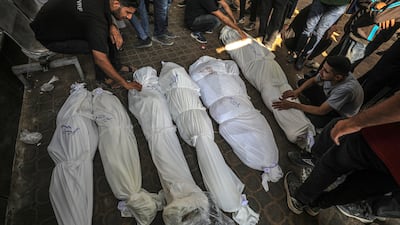July 17 marked International Criminal Justice Day – commemorating the 1998 adoption of the Rome Statute, which established the International Criminal Court (ICC). For those of us working in the field of accountability – pursuing war criminals and justice for survivors – it should be a day of reflection and progress. Yet in 2025, it feels like an act of resistance just to believe that justice is possible.
The odds are stacked against us. Criminals often walk free, shielded by powerful states. We see images of children in Gaza dying from malnutrition – victims of Israel’s starvation policy as found by ICC prosecutors – while our mechanisms to stop it are blocked at every turn.
The ICC Office of the Prosecutor has launched an investigation into Israeli Prime Minister Benjamin Netanyahu for the deliberate targeting of civilians and the use of starvation as a method of warfare. But progress is painfully slow. The Court has no jurisdiction over the US or Israel, and both actively obstruct it. During the 1998 Rome negotiations, the US refused to join, citing fears of “politically motivated” prosecutions. Israel claims its military operates within the laws of war.
Earlier this month, Mr Netanyahu travelled to Washington to meet US President Donald Trump, defying international pressure. In retaliation for the ICC investigation, the US imposed sanctions on ICC Prosecutor Karim Khan – restricting his travel and freezing assets. The US has also targeted Francesca Albanese, the UN Special Rapporteur on the occupied Palestinian territories, who continues to speak out despite pressure.
While Mr Khan has remained largely silent, Ms Albanese has not. On the same day she was sanctioned, she condemned Italy, France, and Greece — ICC member states — for allowing Mr Netanyahu’s aircraft to cross their airspace instead of arresting him.
Meanwhile, the UN’s top court, the International Court of Justice (ICJ), has issued orders for Israel to allow humanitarian aid and halt military actions that risk genocide. Yet these rulings rely on enforcement by the Security Council — where the US has repeatedly used its veto to protect Israel from accountability.
Still, the evidence grows. Just last week, renowned genocide scholar Omer Bartov, an Israeli Jew and former Israeli soldier, published an op-ed in The New York Times arguing that Israel is committing genocide. It was a watershed moment, not just for the clarity of his language but for where it was published.
But even as the case against Israel strengthens, we must confront the painful truth: the very systems designed to deliver justice are being blocked or undermined.
UN Secretary General Antonio Guterres has issued some of the strongest statements I’ve seen from a UN leader, and his adviser Melissa Fleming continues to condemn Israel’s attacks on civilians. Still, several Security Council votes calling for a ceasefire have been vetoed by the US.
On July 20, the General Assembly overwhelmingly passed a resolution, drafted by Spain, condemning the use of starvation as a method of warfare. Yet even as that resolution passed, Israeli forces bombed a Catholic church in Gaza and continued killing hundreds daily, many of them women, children and people waiting at feeding stations.
In short, it would appear that Mr Netanyahu is mocking international justice.
But it is not hopeless – if we accept that justice is a long game. Since the Second World War, alternative pathways for accountability have evolved. This is where civil society must lead.
My team at The Reckoning Project focuses on creative approaches to accountability. We combine international courts, third-state prosecutions, UN mechanisms, and civil society pressure. Justice is rarely linear, but it is possible.
Everything hinges on political will. Countries such as Spain and Ireland are stepping up. But when the US, UK and Germany actively block legal mechanisms, they become complicit. Britain continues arms transfers to Israel, and recent revelations show it is also sharing battlefield intelligence.
This is where advocacy matters. Journalists, investigators and human rights workers must keep the pressure high. It worked in Bosnia. It worked in Kosovo. It can work again.
The ICC case can and must be strengthened – with robust documentation, clear evidence chains, and legal submissions under Article 15. We must link Netanyahu directly to command decisions and demonstrate intent.
Countries with universal jurisdiction, such as Germany, Belgium, South Africa and Argentina, can open domestic cases. These can be reinforced by the ICJ’s initial findings and ongoing proceedings in the genocide case.
Targeted sanctions, such as Magnitsky-style bans – that is, laws providing for governmental sanctions against foreigners who have committed human rights abuses or been involved in corruption – should be imposed by countries such as Norway, Ireland and Spain. But this depends on political will.
Which brings me to the most powerful tool we have: the court of public opinion. The truth must be told, clearly and relentlessly. In the case of Gaza, the horror doesn’t need exaggeration as the facts speak for themselves. Free press can drive public protest and shift political inertia.
The alternative is complicity in what has been described by legal experts as genocide, and as shown in the mounting evidence before the ICJ. I have witnessed three genocides in my lifetime. I cannot remain silent as another unfolds. To look away would be to abandon our shared humanity.


